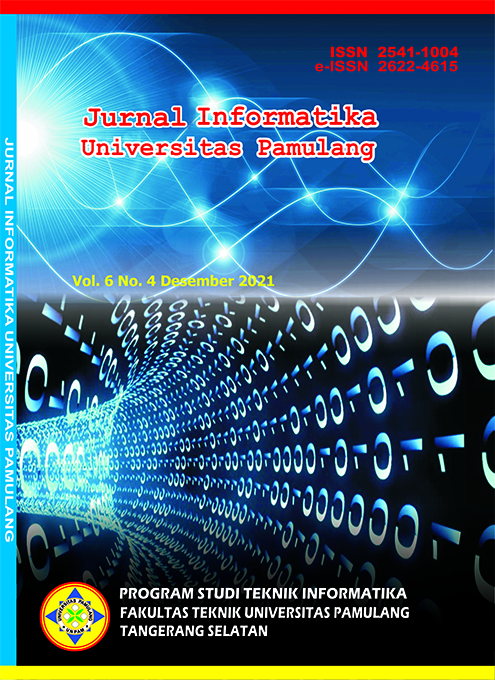Analisis Sentimen terhadap Layanan Indihome di Twitter dengan Metode Machine Learning
DOI:
https://doi.org/10.32493/informatika.v6i4.13247Keywords:
Sentiment Analysis, Indihome, Twitter, Random Forest, Gradient Boosted TreesAbstract
Indihome is a digital service such as the internet that can be used at home, landlines and interactive TV. However, because it is so extensive, Indihome has received a lot of criticism because the internet connection is rarely stable. Therefore, a sentiment analysis in the field of was carried out data mining on customers Indihomeon Twitter social media which consisted of 1350 data and filtered into 1309 data because a lot of data indicated duplicates. In this study, researchers used the methods Random Forest and Gradient Boosted Trees (GBT). This research was conducted using tools Rapidminer version 9.8. Research shows that sentiment analysis on Indihome services using the method Random Forest achieves an accuracy of 99.54% with class precision for pred. negative is 99.92%, pred positive is 25.00%, and pred. neutral is 60.00%. Then the GBT method has an accuracy rate of 99.31% with a precision class ofn for pred. negative is 99.46%, pred. positive is 0.00%, and pred. neutral is 0.00%. So it can be concluded that the Random Forest method is a better method when compared to GBT.
References
Bisri, A., & Rachmatika, R. (2019). Integrasi Gradient Boosted Trees dengan SMOTE dan Bagging untuk Deteksi Kelulusan Mahasiswa. Jurnal Nasional Teknik Elektro Dan Teknologi Informasi (JNTETI), 8(4), 309. https://doi.org/10.22146/jnteti.v8i4.529
Christy, E., & Suryowati, K. (2021). Analisis Klasifikasi Status Bekerja Penduduk Daerah. 6(1), 69–76. Retrieved from https://ejournal.akprind.ac.id/index.php/STATISTIKA/article/view/3519/2577
Fitriasti, N. A., & Priansa, D. J. (2021). STRATEGI DIRECT MARKETING DALAM RANGKA MERANGSANG MINAT PENGGUNAAN PRODUK INDIHOME. 7(4), 665–671. Retrieved from https://openlibrarypublications.telkomuniversity.ac.id/index.php/appliedscience/article/view/15264
Hidayat, E. Y., Hardiansyah, R. W., & Affandy. (2021). Analisis Sentimen Twitter untuk Menilai Opini Terhadap Perusahaan Publik Menggunakan Algoritma Deep Neural Network. 02, 108–118. Retrieved from https://teknosi.fti.unand.ac.id/index.php/teknosi/article/view/1887/pdf
Maulana, F. A., Ernawati, I., Labu, P., & Selatan, J. (2020). Analisa sentimen cyberbullying di jejaring sosial twitter dengan algoritma naïve bayes. Seminar Nasional Mahasiswa Ilmu Komputer Dan Aplikasinya (SENAMIKA, 529–538. Retrieved from https://conference.upnvj.ac.id/index.php/senamika/article/view/619
Putra, A. I., & Santika, R. R. (2020). Implementasi Machine Learning dalam Penentuan Rekomendasi Musik dengan Metode Content-Based Filtering. Edumatic : Jurnal Pendidikan Informatika, 4(1), 121–130. https://doi.org/10.29408/edumatic.v4i1.2162
Rasenda, R., Lubis, H., & Ridwan, R. (2020). Implementasi K-NN Dalam Analisa Sentimen Riba Pada Bunga Bank Berdasarkan Data Twitter. Jurnal Media Informatika Budidarma, 4(2), 369. https://doi.org/10.30865/mib.v4i2.2051
Suarjana, I. K., & Suprapti, N. W. S. (2018). Pengaruh Persepsi Harga, Pengetahuan Produk, Dan Citra Perusahaan Terhadap Niat Beli Layanan Multi Servis Merek Indihome. E-Jurnal Manajemen Universitas Udayana, 7(4), 251833. https://doi.org/10.24843/EJMUNUD.2018.v07.i04.p08
Syahputra, R. D., & Sampurno, W. (2019). Analisis Kualitas Pelayanan Nilai Pelanggan Berbasis Digital pada Media Sosial Facebook terhadap Kepuasan Pelanggan (Studi Pada Produk Indihome Di Plaza Telkom Lembong Kota Bandung Tahun 2019). EProceedings of Applied Science, 5(3), 1841. Retrieved from https://openlibrarypublications.telkomuniversity.ac.id/index.php/appliedscience/article/view/11042/10910
Syukron, A., & Subekti, A. (2018). Penerapan Metode Random Over-Under Sampling dan Random Forest Untuk Klasifikasi Penilaian Kredit. Jurnal Informatika, 5(2), 175–185. https://doi.org/10.31311/ji.v5i2.4158
Downloads
Published
Issue
Section
License
Authors who publish with this journal agree to the following terms:
- Authors retain copyright and grant the journal right of first publication with the work simultaneously licensed under a Creative Commons Attribution-NonCommercial 4.0 International (CC BY-NC 4.0) that allows others to share the work with an acknowledgement of the work's authorship and initial publication in this journal.
- Authors are able to enter into separate, additional contractual arrangements for the non-exclusive distribution of the journal's published version of the work (e.g., post it to an institutional repository or publish it in a book), with an acknowledgement of its initial publication in this journal.
- Authors are permitted and encouraged to post their work online (e.g., in institutional repositories or on their website) prior to and during the submission process, as it can lead to productive exchanges, as well as earlier and greater citation of published work (See The Effect of Open Access).
Jurnal Informatika Universitas Pamulang have CC-BY-NC or an equivalent license as the optimal license for the publication, distribution, use, and reuse of scholarly work.
In developing strategy and setting priorities, Jurnal Informatika Universitas Pamulang recognize that free access is better than priced access, libre access is better than free access, and libre under CC-BY-NC or the equivalent is better than libre under more restrictive open licenses. We should achieve what we can when we can. We should not delay achieving free in order to achieve libre, and we should not stop with free when we can achieve libre.
Jurnal Informatika Universitas Pamulang is licensed under a Creative Commons Attribution-NonCommercial 4.0 International (CC BY-NC 4.0)
YOU ARE FREE TO:
- Share : copy and redistribute the material in any medium or format
- Adapt : remix, transform, and build upon the material for any purpose, even commercially.
- The licensor cannot revoke these freedoms as long as you follow the license terms





